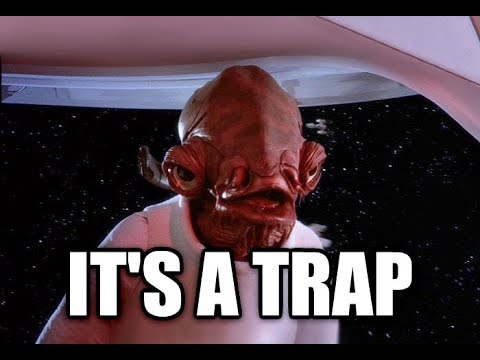If you’re in the enviable position of having enough disposable income to max out your 401K account then first off, congrats! Secondly, I’d also like to congratulate you on your prudence in thinking of investing your excess income vice spending it to upgrade your lifestyle. Because like Admiral Ackbar so aptly put it in Star Wars Episode IV, “It’s a trap!”

Now that the non-nerds have left the chat, let’s discuss whether to max out your 401K or open a cash brokerage account and invest yourself.
The questions you will need to ask yourself before deciding are:
1 – How much investing experience do I have?
2 – How is my 401K performing?
3 – Are the potential tax savings benefits of a 401K worth it to me?
How much investing experience do I have?

Let’s delve into the first question shall we? If you’re a complete novice and you’re thinking of diverting your primary retirement savings to an account so you can experiment with investing – STOP IT, GET SOME HELP!
I would definitely recommend that you leave it to the professionals. Your retirement account is not the place to learn how to invest. Instead, try downloading a mock trading app like the one available on Thinkorswim called Paper Money. It’s free, it’s fun, and best of all, you wont be risking your future. However, if you are an experienced investor, read on.
How is my 401K performing?
Are you happy with the returns that you’re getting from your 401K broker? How are the returns stacking up against the broader market? If you’re lucky enough to work for a company that uses a reputable broker such as Fidelity, Vanguard, TRowe Price, etc… chances are your 401k is performing just fine. Decent performance coupled with the potential tax benefits and low fee structure lends credence to leaving well enough alone.
If you are stuck with few investment choices, high fees and sub-par performance, investing up to the company match and then investing the rest on your own could be a viable option.
Are the potential tax benefits worth it to me?
Companies are giving employees more options than ever when it comes to their 401k investments. You can choose to have your contributions diverted to either a traditional 401k (tax deferred) or a Roth (taxed now). If you don’t know the difference click here to get yourself caught up. Maxing out your traditional 401k may give you the benefit of dropping to a lower tax bracket, while maxing out your Roth 401K will pay dividends when you retire as you’ll have tax free income to enjoy. I’d recommend speaking with a financial advisor to crunch the numbers for you if you’re unsure about which route to go.
In conclusion, there are many pluses and minuses to deciding where to invest your retirement contributions. Hopefully I’ve been able to provide you with some insightful questions to help you along your journey.
Happy Investing!






